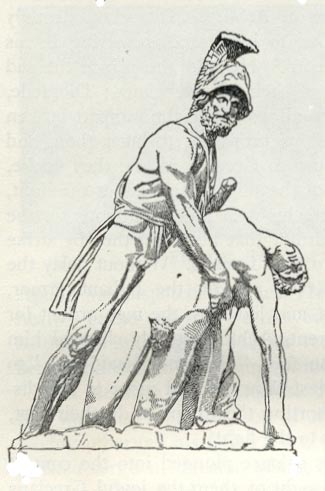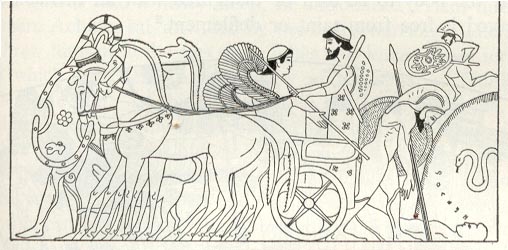Masterpieces of Western Literature
| Unit 3 |
|
English
201:
Masterpieces of Western Literature |
| .Unit 3 Reading | Course Reading | Entry Page |
| Introduction | Background | .Explication | Questions | Review |
Background:
Ponies:
WT students should appreciate horses & horse jokes. Homer wasn't
a Texan, nor a cowboy, but I would like to have seen the horses he imagined.
When you visit Venice you will see near cousins to:
16.173
Xanthos & Balios, racers in wind.
16.177
In the side-traces Pedasos, a thoroughbred,
was added to the team . . .
Mortal, he ran beside immortal horses.
Isn't this what we aspire to? Mortals though we are, to run with divinities.
The joke is a reversal of our experience with pets. Our dogs &
horses get old & die before us. Thus Zeus laments over the divine
horses:
17.497 Poor things,
why did I give you to King Peleus,
a mortal, you who never age nor die,
to let you ache with men in their hard lot?
The horses stand weeping for PAT whom they cannot save from death:
17.479 The horses
of AK, from the time
they sensed their charioteer downed int he dust
at the hands of deadly HK, had been weeping.
Later, as though he remembers his failure to bring PAT back from battle
alive, Xanthos warns AK:
19.453 Yes, we shall
save you,
this time, too, AK in your strength!
& yet the day of your destruction comes,
& it is nearer. We are not the cause,
but rather a great god is, & mighty Fate.
Nor was it by our sloth or sluggishness
the Trojans stripped PAT of his armor.
The divine horses:
19.461 might run swiftly
as the west wind blows
but they cannot help man outrace death:
19.463 it is your
destiny to be brought low
by force, a god's force & a man's!
Aristocrats:
We will consider the problems of aristocratic power for the polis
in our Review. Here I simply want to
call your attention to AK's special status as the son of Thetis.
Having tried to desecrate HK's corpse for many days, AK is not judged guilty
of outrageous behavior (hubris). Zeus tells Thetis:
24.133 I, however,
accord AK honor
as I now tell you -- in respect
for you
whose love I hope to keep hereafter.
A little bit later, Zeus decrees that AK:
24.187 is no madman,
no blind brute, nor one to flout the gods,
but dutiful toward men who beg his mercy.
Isn't this news to us? We remember AK telling the dying HK that
he wishes he could revive him only in order to kill him again & that
every scrap of his body would be devoured by dogs & vultures &
worms. Perhaps you think AK has changed, grown mature & is now
empathetic. It is certainly true, as Aeschylus says about his tragic
characters, that AK has suffered into wisdom. I think we have to
take aristocratic privilege into account in order to exaplain why AK is
not held to stricter standards of behavior. Priam scolds his remaining
children:
24.304 Would god
you had been killed
instead of HK
24.313 These poltroons
are left,
hollow men, dancers, heroes of the dance
Because they live deeper or greater lives than the rest of us, shouldering immense & crushing responsibilities, aristocrats apparently do not have to be as attentive as the rest of us to little courtesies & manners. Indeed, Priam ridicules the timid & mincing steps of dance compared to marching, racing, & standing in battle.
Funerals:What
is the big deal about corpses? When Sarpedon falls under PAT's weapons,
PAT prays, "may we take him, dishonor him" (16.645). Zeus "unfurled
a deathly gloom" around the body & ultimately commands:
16.764 Come, dear Phoibos,
wipe away the blood mantling Sarpedon;
take him up, out of the play of spears,
a long way off, & wash him in the river,
anoint him with ambrosia
16.772 there his kin &
friends may bury him
with tomb & stone, the trophies of the dead.
| We are told that a similar "long
& bitter struggle ensues for possession of" PAT's body (17 summary,
p. 207). Ak vows to bury (or burn) PAT's body cutting the throats
of 12 children (18.392). He subsequently drags HK's corpse around
PAT's tomb (24.16). HK is seems almost as concerned for his corpse
as for his life:
22.402 I beg you [AK] by your soul & by your parents, do not let the dos feed on me (The illustration is of Akhilleus holding
Patroklos' corpse.)
|
 |

Click on the next section: Explication
above.